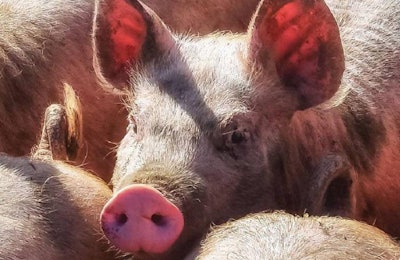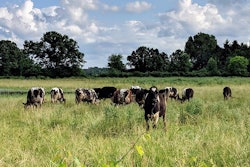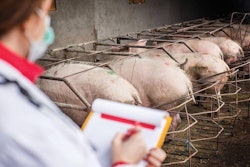
Several European countries continue to grapple with the deadly disease, but Africa has had no new reports in the past week.
African swine fever (ASF) has spread to domestic pigs in a previously unaffected area of Romania, and new outbreaks have been confirmed in Bulgaria and Ukraine. Hungary and Poland continue to report significant losses of wild boar to the disease, but no new cases have been confirmed in Africa.
The battle to control ASF in Romania continues as the disease has been detected in two counties in the center of the country for the first time.
According to the official report to the World Organisation for Animal Health (OIE), the infection has been detected in two backyard herds in Covasna and Sibiu. In one of these, a sample of frozen meat tested positive for the virus. Ten pigs died as a result of the discovery, and a further 40 have been slaughtered.
In other Romanian counties, ASF has hit 10 backyard herds and one farm. Four pigs out of more than 5,000 animals died at the farm in the south of the country. The rest of the herd has been destroyed, as have nine backyard herds in the same part of the country, and one in the eastern county of Braila.
One farm in Bulgaria has also been confirmed with ASF, according to the agriculture ministry’s latest report to the OIE. This led to the loss of more than 100 pigs in the southeastern region of Burgas.
The only pig belonging to an owner in eastern Ukraine has tested positive for ASF after succumbing to the disease. This was the second premises to be affected in Poltava oblast, according to the latest official report to the OIE from the national animal health agency.
Up to October 20, there have been 1,692 confirmed outbreaks of ASF among domestic pigs in Europe so far in 2019, according to the European Commission (EC). That is 16 more than the previous week.
From this source, by far worst affected has been Romania (1,516 outbreaks). Poland has 48, Bulgaria 40, Ukraine 38, Lithuania 19, the Republic of Serbia 18 and Slovakia 11. There has been one outbreak in Italy and Latvia, earlier in the year. EC figures do not include cases in Russia.
ASF situation ‘resolved’ in Moldova, Romania and Ukraine
Following previous ASF outbreaks this year, the food safety agency in Moldova has informed the OIE that the ASF situation has been “resolved” in the southern district of Cahul, and in Nisporeni in the west. The last confirmed outbreaks were in August and September, respectively.
A similar declaration has been made by Ukraine’s animal health agency to the OIE. This situation applies to Kiev in the north, as well as the southern oblasts of Kherson and Odessa. There have been no new cases of the disease in the country for at least two months.
Although continuing to battle the disease elsewhere, Romania appears to have eliminated ASF from two regions. In those counties, there have been no new cases for a prolonged period, according to the state veterinary service reports to the OIE. This applies to Teleorman in the south — where the most recent outbreak was in January — and the next month in Constanta in the southeast.
6 European states confirm new cases of ASF in wild boar
ASF is hitting the wild boar population of Hungary particularly hard.
Based on its reports to the OIE, the agriculture ministry has confirmed a total of 80 cases at 68 different locations. In a series of ASF “hot spots” across the north and northeast of the country, as well as in forest near the capital, Budapest, the animals were found in the period October 10-20.
Poland’s agriculture ministry has reported a further 47 historic cases of ASF in wild boar to the OIE over the past week. Infection was confirmed in these animals during the second half of July this year. All were in the previously affected provinces of Warmia-Masuria, Mazovia, Lublin and Podlaskie.
OIE has also been informed by the respective animal health agencies of new cases of ASF in wild boar in Romania (17 animals), Latvia (12), Russia (2) and Bulgaria (1).
This year, there have been 4,861 confirmed outbreaks of ASF among European wild boar up to October 20, according to the EC. That figure is has increased by 84 from the previous week’s report.
Poland has reported the most outbreaks (1,818), followed by Hungary (1,191), Romania (520), Belgium (479), Lithuania (389), and Latvia (266), Bulgaria (77), and Estonia (71). Other European states reporting some outbreaks in wild boar during 2019 — but fewer than 30 animals affected — are Italy, Slovakia and Ukraine.
Africa: No official reports of new cases
No new ASF cases in African states have been reported to the OIE over the past week.
There has been no confirmation about suspected cases in the West African Republic of Ivory Coast (Côte d’Ivoire), reported by local media recently.
Three previous outbreaks in domestic pigs during July and August have been officially reported by the state’s animal health agency.
From the Kenyan agriculture ministry, OIE has been informed that there have been no new ASF outbreaks since one semi-intensive farm in the center of the country was confirmed with the disease on August 23. However, “many mortalities” have been reported during September, according to the ministry, but the cause of death has still to be reported.
Other African states that have confirmed ASF cases during 2019 are Ghana, South Africa and Zimbabwe.
View our continuing coverage of the global African swine fever situation.
















